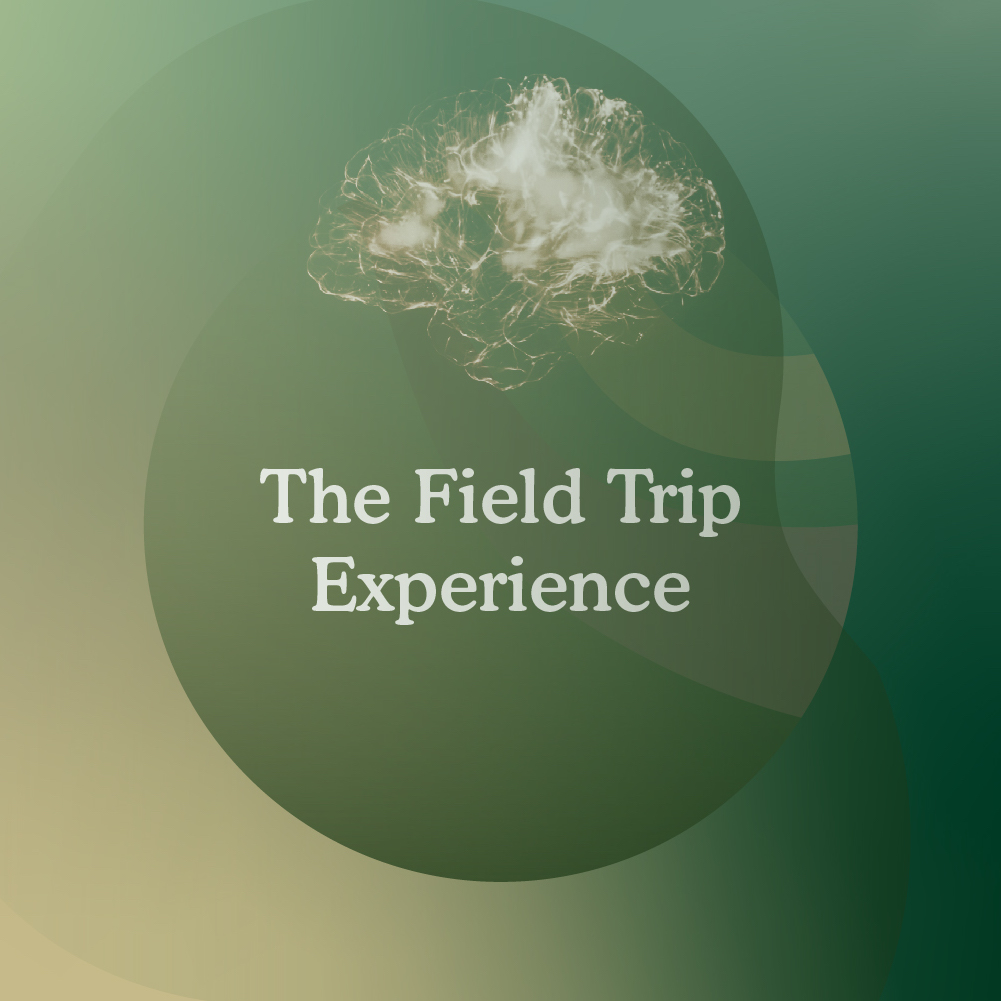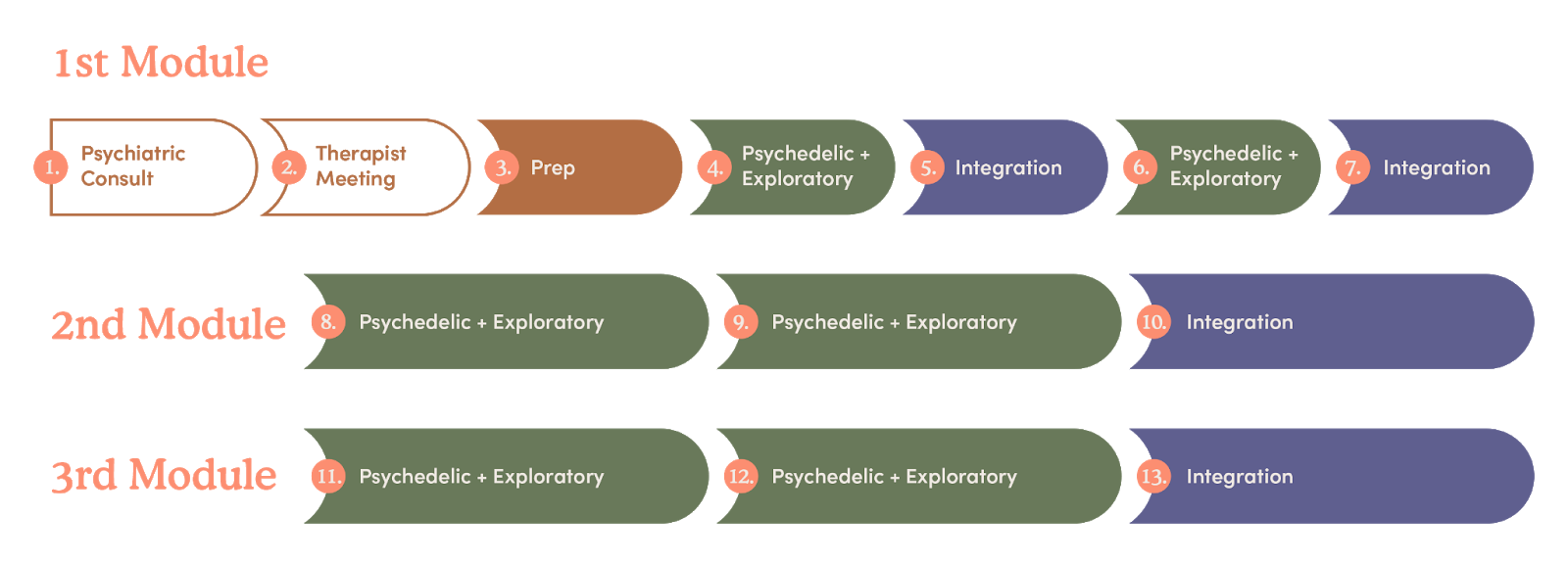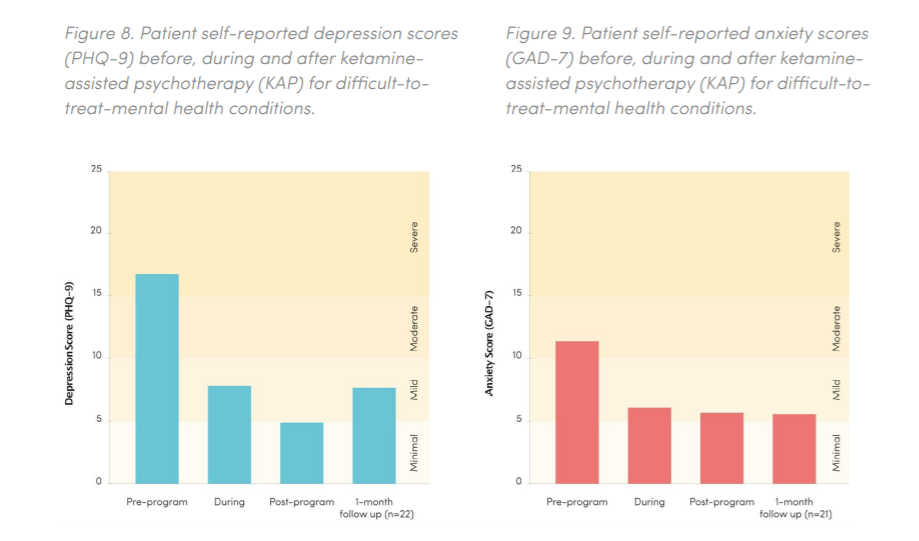
The World Health Organization predicts unipolar depressive disorders will rank as the leading cause of the global burden of disease by 2030. We know that the treatment of mental health conditions like depression need to be holistic in order to be successful in the long term, and there is a major gap in the adequate options available.
Field Trip Health is filling this gap by offering a comprehensive treatment method designed to help those suffering from treatment resistant mental health conditions, including depression, generalized anxiety disorder, and trauma. Our outpatient mental health centers combine the science of modern medicine and technology with the wisdom of the psychotherapeutic psychedelic approach.
The Importance of Set and Setting
One of the most crucial factors in facilitating the benefits of psychedelic assisted psychotherapy is the set and setting. “Set” refers to the patient’s mindset, mood, and intention, and “setting” refers to the atmosphere; the physical and social environment in which they have the experience and the container of the therapeutic relationship.
A medical director, psychiatrist, and a team of medical practitioners and psychotherapists staff each Field Trip center. They help to create the right mindset for the patient by encouraging mindfulness exercises and intention setting throughout the consultations, therapy sessions, ketamine sessions and integration sessions. This prepares a patient for what they are about to experience in order to receive it openly and purposefully.
The Field Trip clinics are also designed to provide a welcoming, safe, soothing, comfortable and engaging environment for patients. Through carefully crafted interior design schemes, curated music playlists, and comfort items like weighted blankets and eye masks, the setting facilitates a relaxing and pleasing space for profound self-healing to occur.

Our clinics are located in Toronto, New York, Los Angeles, Chicago, Atlanta, Houston, and Amsterdam.
How is Ketamine Incorporated?
With Field Trip’s Ketamine Assisted Psychotherapy (KAP) approach, ketamine is injected intramuscularly or taken orally in a lozenge. The dosage is adequate enough to produce the dissociative effect, and the experience lasts from 45-90 minutes. Before, during, and after the experience, the patient has ready access to therapy and guidance.
While recreational use of ketamine is more for going out, the set and setting provided at Field Trip is for going in. Patients are administered a dose of ketamine, which brings them into a trance-like dissociative state. Patients are reclined in a zero gravity chair in rooms with state-of-the-art sound design, given noise-cancelling headphones and a blackout mask. Sometimes experimental technologies like virtual reality are used, depending on the patient’s needs and goals. A psychotherapist is nearby to help guide them through any uneasiness and to facilitate the journey inward. The goal of the session is to access and facilitate inner healing intelligence.
The Patient Journey
Because this model is designed for clients with difficult-to-treat depressive conditions, all Field Trip therapists who conduct in-clinic sessions have been trained in therapeutic approaches specific to psychedelic-assisted psychotherapy.
Typically, the program consists of 2 intake and preparatory psychotherapy sessions, 4 Ketamine Exploratory Sessions (targeting peak experiences), and 3 integration sessions.
IMAGE: FIGURE 12 – Patient Journey – pg 18 of Field Trip Psychedelic Medicine Whitepaper

Intake & Prep
In Canada, Field Trip clients require a referral from a physician in order to begin the intake process. In the United States, a referral is not required. Once a referral is received, or a prospective client reaches out, a licensed staff psychiatrist will screen the individual to ensure that ketamine-assisted psychotherapy is the right fit. This evaluation is both psychiatric and psycho-spiritual, and typically involves completing a secure medical intake questionnaire and a consultation, including an assessment of the patient’s experience with altered states.
Once ketamine-assisted therapy is deemed a fit, the preparatory work begins. This phase is geared to help the patient optimize the benefits from the sessions. The therapist will provide all of the pertinent information needed to gain an understanding of what is to come, helping to ease anxiety and enter a state of openness for an optimal session. This phase is also for establishing the relationship between therapist and patient. The intake session is the first step in building an alliance of safety and trust. An important aspect of this relationship-building is getting a better understanding of what the goals and intentions are for the process, and to define what the patient will need to access to facilitate their own healing. From there, both patient and therapist are equipped with the knowledge and tools they will need to begin the journey.
Ketamine Exploratory Sessions
After the preparatory session, they will cycle through the process of 2 Ketamine Exploratory Sessions. A single session lasts approximately 2 hours, including the intention-setting foundation, peak psychedelic experience and additional time spent reflecting with the therapist talking about the experience. The ketamine journey itself can typically last 45-90 minutes. These 2 hour sessions provide ample space and time to allow the patient to loosen their ego’s grip to undergo the experience openly, share their experience and reconstitute before they leave.
Throughout the average 12-session program, clients are given standardized clinical questionnaires to measure progress and clinical outcomes. They are also given access to other self-help resources, including the Field Trip Health Patient Portal, which houses mindfulness tools, therapeutic meditation exercises, mood tracking journals and other educational content to help them build their own coping skills and to further integrate the insights gleaned from the in-person sessions.
Integration Therapy
Sandwiched between these Ketamine Exploratory Sessions are 3-4 integration sessions, with the first typically occurring after one or two sessions. These therapy sessions involve evidence-based, client-centered talk therapy techniques including cognitive behavioral therapy, motivational interviewing, behavioral activation, and more.
Integration therapy works to harness the insights, feelings, and energetic and emotional content that comes out of the experiences. The therapist essentially provides the client with a container and mirror to process the emotions and insights that may have arisen during or after the Ketamine Exploratory Sessions. Within the window of neuroplasticity that ketamine and other psychedelics provide, this assimilation makes use of the content in a therapeutic manner by crafting actionable items that one can integrate sustainability into their daily life. These additions are what constitute lasting changes in mental wellbeing.
How Ketamine and Other Psychedelics Facilitate Healing
A key component in the psychedelic experience afforded by ketamine is the temporary suspension of the Default Mode Network (DMN). The DMN is a neurological network that is characterized by self-referential mental thought and episodic memory retrieval and scene construction. Buddhist have called this the monkey mind, referring to the mind’s natural tendency to be restless. The DMN comes online when we are not focused on any task in particular, and so relies on habitual thought patterns.
Some default thought is necessary to function, but relying on this too much can make changing habits and behaviors more and more difficult as time goes on, as these heavily trodden pathways can lead to the stagnation of novel thought. Psychedelics show a decrease in the Default Mode Network, allowing the mind the neuroplasticity required to forge new paths. This is where healing can take place, making it especially beneficial in treatment resistant mental disorders.

Communication between brain networks in people given psilocybin (right) or a non-psychedelic compound (left).PETRI ET AL./PROCEEDINGS OF THE ROYAL SOCIETY INTERFACE
One of the factors that play a key role in the disordered physiological processes associated with depression and related disorders is the atrophy of the prefrontal cortex. Ketamine has been found to promote both structural and functional plasticity in the prefrontal cortex, which is what underlies its rapid antidepressant properties. Psychedelic compounds can directly prevent this atrophying, as they promote the growth of connections between neurons.
For Field Trip Health, what is most important for measuring the success of Ketamine Assisted Therapy is the results. Clients have demonstrated rapid and meaningful decreases in difficult-to-treat mental health conditions, including depression, anxiety and trauma. These results also prevail in the longer term. A subset of patients with 1-month follow-up data reveal the resilience of these antidepressant effects.
IMAGE: FIGURE 8 – Field Trip Psychedelic Medicine Whitepaper:

Risks and Benefits
Some of the side effects of ketamine use are changes in heartbeat and blood pressure. These are usually not problematic, and our licensed professionals are medically prepared should anything go awry.
Another possible associated negative experience is temporary anxiety or worry about the experience. Recreational use of ketamine, typically taken without proper care, intent, or in an anxiety-provoking environment, can produce a bad trip. Psychedelics are powerful substances that can be unpredictable and overwhelming for some people. Experienced professionals are by your side to help minimize the anxiety felt during the experience by creating safe, comfortable environments and helping you establish an open, relaxed mindset to produce a beneficial session.
While the psychedelic or dissociative effects can be present even at low doses, a number of studies point to these experiential components as positive arbitrators of the antidepressant effects. The research suggests that these components of the treatment are integral to enhancing and sustaining the positive outcomes.
The positive outcomes include enhanced mental flexibility and open-mindedness due to the reprogramming of the Default Mode Network, rapid relief from depression and anxiety, and the facilitation of mental healing and trauma work.
Does Field Trip Health Have a Clinic Near Me?
Field Trip Health has clinics across Canada in Toronto, Montreal, Vancouver, Ottawa, Hamilton, Kitchener-Waterloo, Thunder Bay, and Sault Ste. Marie, and an at-home program for those who live more than an hour from the nearest clinic. If you are ready to begin your journey toward healing and build your personalized treatment plan, then book a free discovery call with one of our team members.
SOURCES:
Luckenbaugh, D. A., Niciu M. J., Ionescu D. F. et al. (2014) Do the dissociative side effects of ketamine mediate antidepressant effects. Journal of Affective Disorders 159:56–61. Available from: https://www.sciencedirect.com/science/article/abs/pii/S016503271400055X?via%3Dihub
Ly C., Greb A.C., Cameron L.P. et al. (2018). Psychedelics Promote Structural and Functional Neural Plasticity. Cell Rep. Available from: https://www.ncbi.nlm.nih.gov/pmc/articles/PMC6082376/
Palhano-Fontes F., Andrade K.C., Tofoli L.F. et al. (2015) The Psychedelic State Induced by Ayahuasca Modulates the Activity and Connectivity of the Default Mode Network. PLoS One 10(2): e0118143. Available from: https://www.ncbi.nlm.nih.gov/pmc/articles/PMC4334486/
Phelps, J. (2017). Developing Guidelines and Competencies for the Training of Psychedelic Therapists. Journal of Humanistic Psychology, 57(5), 450–487. Available from: https://journals.sagepub.com/doi/10.1177/0022167817711304
World Federation for Mental Health. (2012). DEPRESSION: A Global Crisis. Available from: https://www.who.int/mental_health/management/depression/wfmh_paper_depression_wmhd_2012.pdf
Xiaoxiao Xu, Hong Yuan & Xu Lei. (2016). Activation and Connectivity within the Default Mode Network Contribute Independently to Future-Oriented Thought. Nature. Available from: https://www.nature.com/articles/srep21001